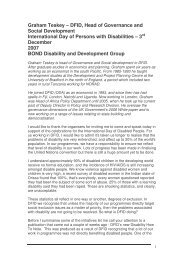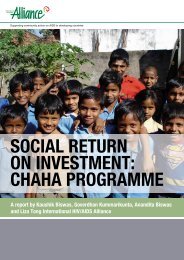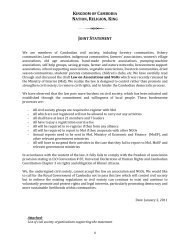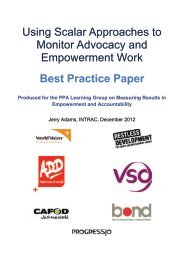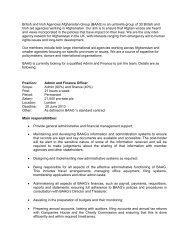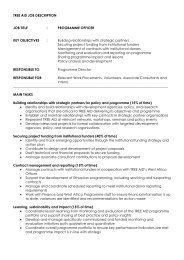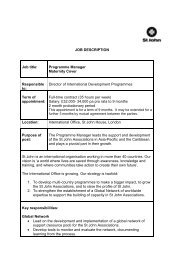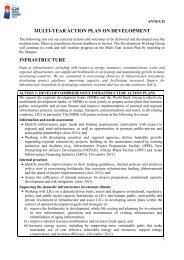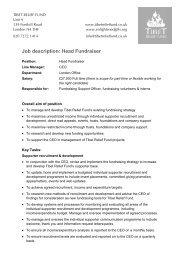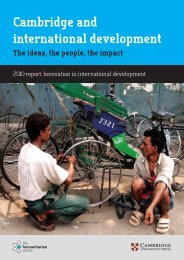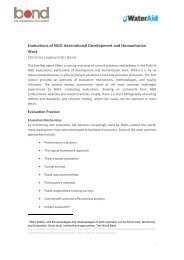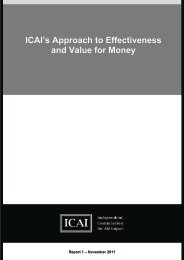Here - Bond
Here - Bond
Here - Bond
- No tags were found...
Create successful ePaper yourself
Turn your PDF publications into a flip-book with our unique Google optimized e-Paper software.
16Philanthropy futures | Impact investing:A growing global opportunity17ImpactinvestingA growing global opportunityImpact investing is here to stay, according to Ted Jackson,and there’s never been a better time for UK developmentNGOs to shape the movement.Impact investing—your smart phonebuzzes with tweets, blogs and reportson it, and your networks and partnersbring it up all the time.As 2013 begins amid heavyworkloads, rapid policy shifts and aturbulent world, what should you doabout this new idea?What is an impactinvestment and who’sinvolved?Impact investments aim to achievesocial or environmental impacts andfinancial returns at the same time. Theymay mobilise private or public capital,or both. From the provision of a loan toa cooperative that builds affordablehousing in Kenya, to the purchase ofshares in a green energy company inIndia—impact investing is found inmany forms across the world.A wide range of players are alreadyinvolved: asset owners such as highnet-worth individuals, charitablefoundations and governments; assetmanagers like investment advisors,fund managers, banks, and specialisedimpact investment funds; demandsideactors that include socialenterprises, small private businesses,microfinance institutions andcommunity developmentcorporations; and service providerssuch as networks, standards bodies,consultants and universities.In fact, over the past five years,these actors have joined forces to createa dynamic young industry—amovement, really—with platforms andchampions emerging in all regions ofthe world. While the initial push camefrom investors in the global north andenterprises and projects in the globalsouth, new structures and funds arebeing created by local leaders in Africa,Asia and the Americas.Impact investingshould be exploitedSo, what should UK developmentorganisations do about all this? Whileimpact investing is not going to replaceaid and other forms of grantassistance—and should not—there is nodoubt now that it will be an element inthe evolving field of developmentfinance for many years to come. Itshould therefore be engaged withenergy and creativity. Indeed, ratherthan passively sitting on the sidelines,development professionals now have toactively shape this movement. This is areal opportunity that should be fullyexploited.There are real debates in andaround impact investing. There aretensions over who will drive this sectorglobally: the ‘north’, the ‘south’, or somenew, flatter G20-like coalition ofchampions? Some impact investors putimpact first, while others (oftenbecause of regulatory obligations) putfinancial returns first—though there arealso recent examples of the sequencingand layering of different types ofinvestors and investment instrumentsin the same enterprise or project.And, yes, the actors in the industrybring different ideological perspectivesto this work. Some see this approach toinvesting as a means of reducing therole of the state in economic and socialThere is no doubt that [impactinvesting] will be an element inthe evolving field of developmentfinance for many years to come.development, but there is also aconstituency that supports a robustrole for both governments and markets.The fact that these and other diversecomponents of the movement canwork together on a common agenda isan indicator of the organising power ofthe concept of impact investing itself.Learn. Test. Build.Assess. Repeat.Recognising such tensions, whatshould UK NGOs actually do aboutimpact investing? First, they shouldlearn more about this concept andmovement. The recipient of a recentmajor DFID grant, the Global ImpactInvesting Network (GIIN) has becomethe pivotal international body for theindustry, offering networking,education and research services.While its origins and foundingmembers are largely American, thenetwork is actively expanding itsmembership and partnerships aroundthe world. Susannah Nicklin, aninvestment professional, is the GIIN’sliaison person based in London.Other international groups withvaluable expertise include:■■Global Impact Investing RatingsSystem (GIIRS), an analogue toStandard and Poor’s for the impactinvesting field■■Impact Investing PolicyCollaborative, which studies andpromotes the role of governmentpolicy to advance impact investing■■Rockefeller Foundation, central tothe start-up of the sector and nowshifting to the demand side■■Omidyar Network, with its leadershipexperience in microfinance andsocial ventures.USAID has also has been a key funderof the field, as have developmentfinance institutions like the OPIC in theUS, FMO, the Dutch development bank,in The Netherlands, together with theInter-American Development Bank.Indeed, the UK itself is home toimpressive capacity in impact investing,which actually began to be built duringthe first term of Tony Blair’s governmentand has continued through the currentgovernment under David Cameron,both inside and outside the state.Among the key sources of expertise areBridges Ventures, Big Society Capital,CAF Venturesome and Social FinanceUK. Alliance Magazine is also a fineresource on philanthropy and socialinvestment.But learning more is just the start.UK development NGOs can becomeactors in the impact investing field inThe Paradigm Project brings clean cooking stoves to rural Kenya.The Paradigm Project aims to develop world-class, impact venturesthat generate meaningful and sustainable economic, social andenvironmental value for millions of families in the developing world.It works primarily in rural Kenya, providing women with cleancooking stoves that reduce wood consumption and toxic smoke,saving long and often treacherous journeys to collect wood andpreventing the development of pneumonia and other respiratoryillnesses. www.theparadigmproject.orgtheir own right. For one thing, theirboards and managements may chooseto test the idea by investing a portion ofthe financial assets they manage inimpact investment funds, or by settingup their own targeted impact funds.They can assess how well this worksand, depending on the results, scale upsuch investments.Together with their southernpartners, UK developmentorganisations can also help nationalnetworks in the south find and nurtureboth local investors and localenterprises that can help build capacityand scale of impact investors on theground. In addition, UK NGOs andtheir partners can support the buildingof local evaluation capacity in southerncountries to hold impact investorsaccountable for their declaredintentions and impact targets.Learn. Test. Build. Assess. Repeat. Thiscycle of action and reflection works andcan be applied to impact investing.That’s what needs to happen now.Ted Jackson, President, E. T. Jacksonand AssociatesE.T. Jackson and Associates is aninternational managementconsulting firm providingprofessional services in strategicplanning, organisational learningand performance assessment togrant-makers and investors in thepublic interest. With a track recordof award-winning work in Africaand Asia, the company specialisesin impact investing, microfinance,social enterprise, civil-societyorganisations, gender equality,local governance, and basic andhigher education.Paradigm Projectthe networker 103 | January – March 2013 bond.org.ukbond.org.ukthe networker 103 | January – March 2013



